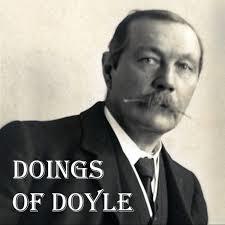Rob Nunn's Blog: Interesting Though Elementary, page 16
July 26, 2020
That is Martha [LAST]
The name 'Martha' is only used in "His Last Bow." She is the only servant left at Von Bork's mansion on the night that the story takes place. While the German agent is showing off to his comrade, Baron Von Herling, the dear old ruddy-faced woman, accompanied by her cat, was bent over her knitting in a different room. As far as Von Bork was concerned, the old lady's self absorption and sleepiness personified Britannia.
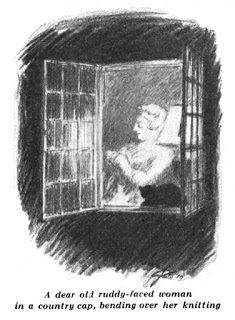
We later learn that Martha has been placed in Von Bork's mansion by Holmes himself and that night signaled Holmes and Watson to arrive at the mansion only after the Baron has left when Holmes could capture the spy without incident. This spy cannot be the Baker Street landlady.
Sure, Mrs. Hudson was helpful by turning the wax dummy of Holmes in "The Empty House," but the woman who had to be instructed to crawl so she wouldn't be seen is now the one privy to Holmes's plans and is making judgments on whether or not he should arrive with the Baron in the house? Mrs. Hudson, a woman who was excited to find a revolver bullet in the carpet of Baker Street has grown into someone who monitors letters written by spies? No, it will hardly do.
"But," some would say, "maybe the landlady grew tired of her digs in London and wanted a life of adventure?"
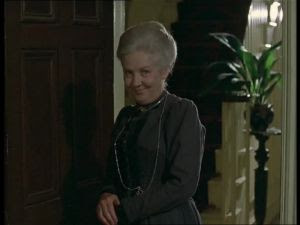
Sure, people long for adventure, but as D. Martin Dakin points out in A Sherlock Holmes Commentary , this theory will not hold water merely for the fact that Holmes addresses the woman in LAST by her first name. "Victorian formality of speech ruled out the use of Christian names for anyone but members of the family (like Mycroft), children (like Jack Ferguson) or servants (like Billy the page or John in 'The Man With the Twisted Lip'). Watson was Holmes's most intimate friend, to whom he was deeply devoted, yet never in all their years together does he call him anything but 'Watson', except when he is 'Doctor' or some similar phrase. It is incredible that he would have been so guilty of such familiarity with the landlady whom, we are told, he had always treated with such gentleness and courtesy."
But the Mandela effect can be strong, so let me offer one more piece of evidence to prove that 'Martha' is not 'Mrs. Hudson.' At the end of EMPT, Holmes is checking in with Mrs. Hudson and shows concern for her well being (“I hope you preserved all precautions, Mrs. Hudson?”), praise for a small task (“Excellent. You carried the thing out very well."), and then a curt dismissal as she is no longer needed for the case at hand ("All right, Mrs. Hudson, I am much obliged for your assistance.").
Holmes's interactions with Martha are quite different. He describes her to Watson as someone "who has played her part to admiration." When she arrives, Holmes says, "Ah, Martha, you will be glad to hear that all is well.” She shows knowledge of the mission as she tells Holmes that she could not have left the previous night when Von Bork wanted her to accompany his wife, because "that would hardly have suited your plans." And, although Holmes dismisses her in his typically curt manner, he makes arrangements to meet with her the following day at Claridge's Hotel back in London. No, Martha was not an old friend whom Holmes asked to help him out. This was a trained agent that Sherlock Holmes trusted to carry out a role and to make decisions that would allow him to achieve his goal of capturing a German spy.
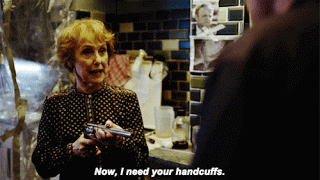
So let go of those fantasies of the nice landlady that doubles as an international spy. Martha and Mrs. Hudson are two different people. Plus, Sherlock Holmes's landlady never owned a cat.
July 19, 2020
Interesting Interview: Jacquelynn Morris

How do you define the word “Sherlockian”?I’m not sure that I can. When I first became active in the Sherlockian community the word was understood to mean those whose pastime was reading, writing, and discussing the Canon as written by Sir Arthur Conan Doyle. Since 2009/2010, when the first Robert Downey, Jr. “Sherlock Holmes” film was released and the first season of BBC Sherlock was introduced in the UK, there was a period of enlightenment where people who had never read one of the stories took a sudden interest in Holmes and Watson as presented onscreen.
Luckily, many liked the characters so much that they became absorbed in the source material of the original stories. Many of those newly-besotted became aficionados in their own way, bringing fresh perspectives and sparking lively discussions while also appreciating—and eventually participating in—more scholarly and traditional pursuits in the community. The definition of “Sherlockian” became more fluid than it had previously, and though there was an adjustment period I feel we have all reaped the benefits of a resurgence of interest in our favorite consulting detective.
How did you become a Sherlockian?I was a great fan of the stories back when I was around 11 or 12 years old, but had no understanding of the existence of the literary community until many, many years later. It wasn’t until around 1994 or so when my brother and sister-in-law recommended the Granada Jeremy Brett series that I rediscovered Holmes. From there it was a complete immersion back into the stories again, while at the same time I became involved in other mystery fiction. Then I joined AOL with the screen name “Sherlockia” (which I had intended to be “Sherlockian,” but AOL limited names to 10 characters), found what was then the Mystery Fiction Forum, and my life would never be the same.

One of my first searches in AOL’s Mystery Fiction Forum was for anything Sherlock Holmes related. There was a Sunday evening chat, “The Scandalous Bohemians,” where each week’s chat focused on one of the canonical stories. There were questions for discussion among the small group of participants and the chat hosts, which included my now long-time friend, Regina Stinson. It was through Regina, who had long been involved in all things Sherlockian, that I first found out about the international community of Holmes aficionados, including the existence of scion societies. Before long I was entrenched in the AOL Mystery Fiction Forum, became a volunteer there, and was assigned the “Hardboiled Mysteries” message board as monitor, moderator, and discussion-starter. On the message board I met a great number of mystery writers who posted regularly; among them future BSIs-to-be Jan Burke, Dana Cameron, and my BSI classmate of 2014, SJ Rozan.
To wrap up this exceedingly long answer to your simple question, I’ll just say that through mystery fiction on AOL I began attending fan-run mystery conventions, where I met Debbie Clark, member of Watson’s Tin Box, who invited me to a meeting. Within two years I was the group’s Gasogene (president) for a year. It was all downhill from there!
What is your favorite canonical story? Had you asked me this prior to 2014, I might have answered differently, but since my BSI Investiture is “The Lion’s Mane” I would have to choose that story. When Chris Redmond asked me to contribute to his About Sixty anthology I requested it, to which he graciously agreed. Should you pick up a copy of ABOUT SIXTY you’ll read my defense of that story as the best of them all (Hint: Some of my defense involves it being one of only two of the 56 short stories and 4 novels that is narrated by Holmes himself).

Who is a specific Sherlockian that you think others would find interesting?Among my Sherlockian friends whom I am privileged to know, I would say that one of the most interesting is Bonnie MacBird, whom I first met in 2012 through our common interest in saving Undershaw, Arthur Conan Doyle’s former home in the UK.
Bonnie is the author of three (so far) Sherlock Holmes pastiches: ART IN THE BLOOD, UNQUIET SPIRITS, and THE DEVIL’S DUE (in addition, she has contributed to a number of Sherlockian publications). She has a fascinating history—she wrote the original screenplay for the movie TRON, won three Emmy Awards for documentary writing/producing, she’s a playwright and director, and teaches acting.
Time spent with Bonnie is always a delight; I’ve had the pleasure of her company at many Sherlockian events over the years, and even once had a lovely tea at her flat in London. She knows a great deal about many, many things, and is a charming and thoughtful conversationalist. Discussing Holmes with Bonnie is a special treat—I hope you have an opportunity to meet her sometime.
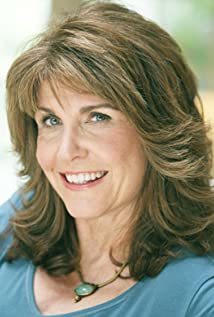
What subset of Sherlockiana really interests you?Oh, there are so many subsets! There are the collectors of books, the collectors of ephemera, people with careers in science and medicine which add so much to our understanding of Canon, writers, artists, curators, sewists of historical garb, historians, archivists, tobacco experts, creators of authentic 221b sitting rooms, experts on the history of the BSI and individuals who added to the hobby throughout its history—it is an embarrassment of riches. Just about any direction one finds to go in our interest in and study of anything related to Canon, there will be fellow travelers. I love the variety, and so have not fixed on any one subset.
What things do you like to research related to Sherlock Holmes?I enjoy finding an angle in a story that may not have caught anyone else’s attention, then researching that angle to prove or disprove my own theory about it. As an example, when I was asked to contribute to the BSI Manuscript Series for The Wrong Passage (“The Golden Pince-Nez”) regarding the poison Anna Coram used, the angle I found was that though it is assumed by nearly everyone that Anna died from the poison the story never says that she did. Through researching poisons available at the time and consulting with experts of my acquaintance I was able to support my theory and propose what poison it had to have been. I love research, even when it doesn’t prove what I want it to!
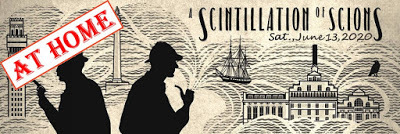
You've been involved with Scintillation of Scions since the beginning. How did it come about and what are some of your favorite memories from it?Scintillation sprang nearly fully-formed from my head during a road trip in early 2008; with the support of Watson’s Tin Box and Peter Blau’s blessing we held the first Scintillation in August 2008. My favorite memory is of that very first event, when we had no money, no one knew who or what we were, I sucked at delegating and tried to do too much myself (bad plan), but, as the years following would continue to prove, Sherlockians are generous and hard-working and will step up to offer to help. That first time was when I saw my vision take on shape and form through the efforts of kindred spirits who shared that vision. It would all have been a terrible flop if not for Watson’s Tin Box, Andy Solberg, Peter Blau, Bill Hyder, Art Renkwitz, Denny Dobry, John Sherwood, Regina Stinson, Joel and Karen Ballard, and the late Paul Churchill, who believed in me.
The vision I had for Scintillation (the name, by the way, was created by Tin Boxer Debbie Clark, as a collective noun, “A Scintillation of Scions”) was to have a Sherlockian “family reunion” for the East Coast aside from BSI Weekend. I imagined a one-track symposium, an afternoon tea, and time for people to socialize and get to know people from other scions. Before we knew it, Scintillation had become known across the country with upwards of 100 attendees (deliberately capped at that number by me, as my vision was not for an all-out convention but for an intimate gathering of kindred spirits). The first couple of years we had to find speakers, but from then on well-known Sherlockians were asking us if they could speak! After ten years of organizing the event, with the help and hard work of an exceptional committee, I decided that it was time for another person’s vision, new ideas, different directions, so Scintillation X was my last, and Karen Wilson has quite successfully taken the reins. The committee stayed on with her and Greg Ruby, with his year's of event planning, came on board. I am exceedingly proud of every one of the Scintillation team!
And speaking of conferences, I first got to meet you at Holmes, Doyle, and Friends back in 2018 where you gave an enlightening talk on the importance of tea in the Canon. What types of teas do you think Holmes and Watson would prefer?Interesting question! We know they drink coffee as it’s mentioned in the Canon, but as for tea I would imagine they would enjoy a strong black tea in the afternoon. I see for Holmes and Watson a good Earl Grey, like Kusmi Tea’s Anastasia (my personal favorite), or Fortnum & Mason’s Smoky Earl Grey (named after Charles, the second Earl Grey, not to be confused with the British actor, Charles Gray, who was Granada’s Mycroft).
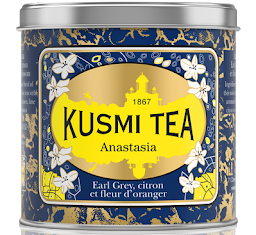
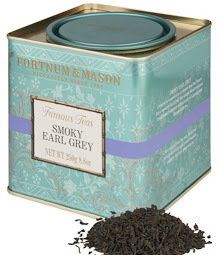
Though these particular blends would have to be sent back to 1895 via a time machine, surely their equivalents were available through different tea vendors in their London. As Earl Grey tea is not traditionally served with milk, neither Holmes nor Watson would muddy the distinct flavor of the bergamot in the tea. Rather, I would expect Holmes to drink his tea straight and Watson to add a bit of sugar or honey and, if Mrs. Hudson was so inclined, a slice of lemon for his cup.
What book would you recommend to other Sherlockians?I have not only recommended it, but I’ve bought copies (8 copies so far, according to Amazon) as gifts of Steve Doyle’s Sherlock Holmes for Dummies. It’s a perfect introduction for new Sherlockians and a valuable resource for the rest of us. I find myself going back to it regularly for information or to refresh my own memory. It really is a great book!
Where do you see Sherlockiana in 5 or 10 years from now? In 5 years’ time I expect that we will all be settled into our particular avenues of interest while continuing to encourage others to discover Holmes and Watson. I’ve been told by those with a longer history in the hobby than myself that there is a resurgence of interest every 15 years or so; there was one during the Jeremy Brett years, then the Robert Downey, Jr. films and BBC Sherlock, which we are still experiencing.
I hope that should I still be above ground 10 years from now perhaps we might be fortunate to have adaptations more aligned with Canon with regard to the stories, as Granada once attempted to do. More diversity in actors and even settings would be optimal; it is the stories with those characters and their unique friendship that caught us up in all of this to begin with. I would love to see Doyle’s stories on screen, loyal to the originals, the plots minimally altered and adapted as time and budget would permit. (I might discourage a showrunner/producer from putting The Mazarin Stone on screen--no one needs that!)
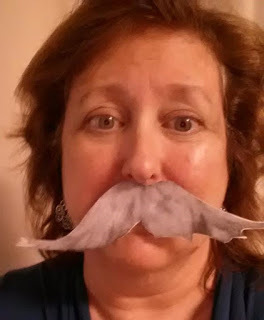
July 6, 2020
Interesting Interview: Mike McSwiggin

How do you define the word “Sherlockian”?
Well, the easy answer is to say someone who dissects the Holmes stories and devours the writings about the writings. But to be honest, the deeper I get into the Sherlockian world, the more I realize that isn’t always the most accurate picture. For some people, sure: they can quote the Canon like some invoke scripture. And some seem to have read every theory about every idiosyncrasy ever published in a Sherlockian journal.
But others have little interest in the writings about the writings. Some obsess over every film adaptation. And others collect one type (or many types) of Sherlock Holmes bauble. I think it really boils down to two traits: a Sherlockian loves Sherlock Holmes and enjoys being around other people who love Sherlock Holmes. Where you fall in the spectrum doesn’t really matter. And, frankly, if we all had the same background and the same interests, we would be a boring group of people who probably would just irritate each other.
How did you become a Sherlockian?
I read the stories fairly early in school. I came across Baring-Gould’s Annotated in the public library and I went from being a fan to becoming an addict. As an adult, I went to some Sherlockian events, and enjoyed them all. But it wasn’t until my friendship with the late Paul Herbert (founder of Cincinnati’s Tankerville Club and walking encyclopedia of Sherlockian knowledge) that I truly understood anything about the Sherlockian world or what I might add to it.
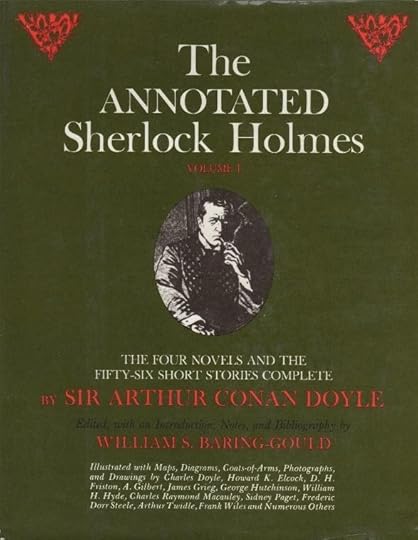
What is your favorite canonical story?
It changes frequently, depending on my mood. For the moment, I’ll say HOUN. There is so much right with this story, and the atmosphere cannot be topped. Being a novella rather than a short story allows that atmosphere to build. But unlike STUD or SIGN, the story remains linear.
And while some knock the story for having less Holmes, I think the proportion of Watson to Holmes makes sense, given the relationships and perspectives that needed to be built. I seem to find at least one new aspect to enjoy with each re-reading. My latest little nugget: bitterns are secretive birds. Who knew? I have no idea what makes a bird secretive, but I like knowing that the bird mentioned in the story has its secrets.
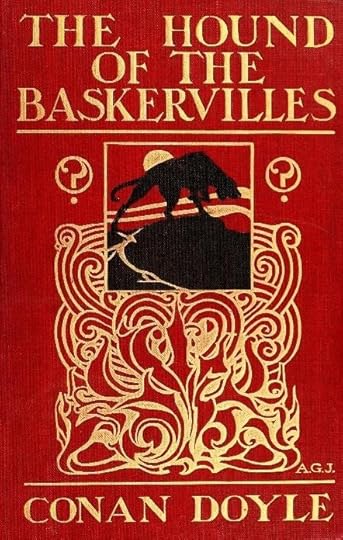
Who is a specific Sherlockian that you think others would find interesting?
Ross Davies. Ross is one of the most interesting people I’ve ever met, Sherlockian or otherwise. He gives some of the most compelling speeches and presentations I’ve ever seen. Whether speaking about World War I, the history of portraiture, or bobbleheads (I’ve seen him espouse upon all three), he knows how to tell a compelling story.
And that makes sense, as Ross is a law school professor. He edits & publishes The Green Bag, a law journal that finds great excuses for working in Sherlock Holmes and Nero Wolfe quite regularly. He now also edits & publishes The Baker Street Almanac, a great resource for Sherlockians (despite having things I wrote in there).
If you are on the fence about going to a conference, and you see Ross will be speaking, you should go. And then do yourself the favor and get up the nerve to speak to him afterward. I did, and I have been joyfully paying the price ever since.

What subset of Sherlockiana really interests you?
Well, Rob, as you had me confess it in a book you co-edited, I am a chronologist. I like reading about the lines of reasoning others have had in trying to date the stories. And then I enjoy crafting my own answers.
For those who haven’t been exposed to this deviancy, know that the stories as they are written pose some problems with the dates as given by Watson. Chronologists seek to divine the actual dates for the cases. Chronology is the red-headed stepchild of the Sherlockian world. I actually told someone at an event that I was a chronologist, and he unconsciously took a step backward. Next time I see him, I’m going to tell him I am also a pickpocket. I wonder if he will back up more or become relaxed?
What things do you like to research related to Sherlock Holmes?
Well, apart from the chronology stuff, I really enjoy crafting insane Sherlockian quiz questions. Paul Herbert was infamous for his maniacally difficult quiz questions at the Tankerville Club. While I don’t like an entire quiz to be made up with those kinds of questions, a few of them peppered among the normal stuff can be fun.
The key is to not limit yourself to information only found in the story. That provides two benefits: it gives you a wider field of play and ruffles the feathers of people who want things to be boring. Here is an example from a quiz I did for BLUE:
Apart from its meaning in the story (which is a type of cap), a Scotch bonnet may also refer to which of the following (circle all that apply):
A:) a variety of chili pepper
B:) a fairy ring mushroom
C:) the official state shell of North Carolina
D:) an island in Lake Ontario
And the answer is, in fact, all four choices.
As a student of chronology, do you think there will ever be a timeline of the Canon that everyone can agree on?
Absolutely not. The average Sherlockian just won’t care. And that diseased subset of Sherlockians called chronologists – we’ll just continue to fight. Watson, through a combination of purposeful obfuscation and general poor note-taking, left us a real Gordian knot. But that’s the fun of it. If someone could devise a unified field theory for this stuff, it probably would have happened already.
And we would instead be arguing about why so many birds are mentioned in the Canon.
What is a piece of Sherlockian scholarship that you think every Sherlockian should read?
I love D. Martin Dakin’s A Sherlock Holmes Commentary, from 1972. It is the total package: it is extremely well-written, the facts cited are correct (I won’t name names here, but there are some works of scholarship with some factual errors – likely due to small or non-existent editing budgets), each chapter represents a different story, there are so many great discussion topics for each case, and each chapter starts off with affixing a date to the given case!
Dakin does a fantastic job of explaining how he decided on each date. But don’t be frightened off, as the chronology discussion is just one facet of each chapter. You do not need to care about chronology at all to get a lot out of this book. Yes, it is out of print (like so many books of Sherlockian scholarship). But you can pick up a decent reading copy for well under $20. And short of an omnibus of the 60 stories itself, you will be hard-pressed to get a better value for your Sherlockian dollar.
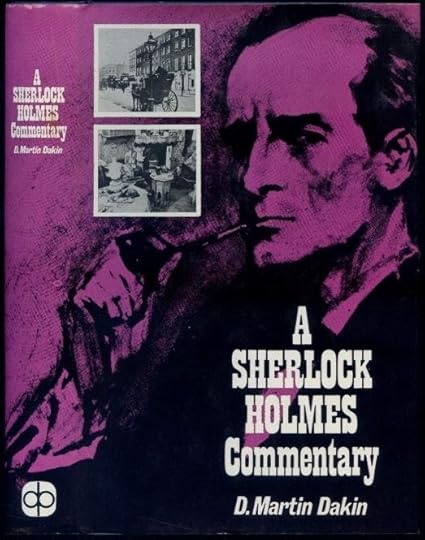
What book would you recommend to other Sherlockians?
If they have never read any Nero Wolfe stories by Rex Stout, I like to recommend Too Many Cooks, which is one of my favorites. I am as much a Wolfean as I am a Sherlockian, and so like to cheer for the other team whenever I can. Stout’s Wolfe stories are so well-done and under-appreciated. Chandler seems to get all of the accolades for mid-twentieth century mystery writers (and, hell, I love his books as well). But Stout took all of that pithiness and added a great sense of humor.
If they HAVE read Stout, I like to recommend Steve Hockensmith. His “Holmes on the Range” stories featuring brothers Big Red and Old Red are fantastic. Great writing paired with great humor. I tend to despise westerns, so for me to recommend anything that could be remotely construed as a western is saying something.
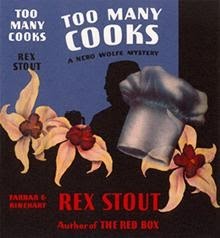
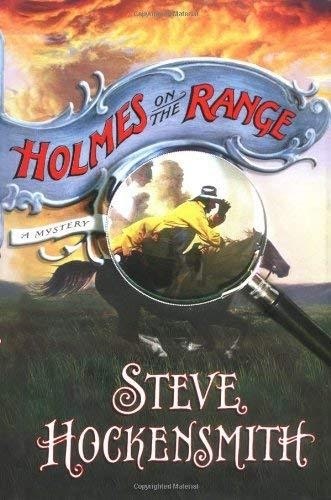
Where do you see Sherlockiana in 5 or 10 years from now?
I am making a conscious decision to answer this as optimistically as I can. I hope we are able to build upon the influx of younger Sherlockians in the last few years. Maybe they came for Cumberbatch, but stayed for the surprisingly fun literary discussion.
And in addition to the younger people, I hope we are able to reach more people of diverse backgrounds. Different countries, different socio-economic groups, different ethnic backgrounds. One of the few positives of this pandemic is attending online Sherlockian meetings and events with people from all over the country (and world). I have really enjoyed hearing discussions with voices unfamiliar to me.
And I love hearing newly minted devotees of Holmes and Watson speak passionately about our shared hobby. Their excitement is infectious. If a Sherlockian event was full of people all with the same opinions, the same perspective, that would be brutally dull.
I just inadvertently came full circle to my answer to your first question, which means I probably should stop and pretend that I planned any of this out.
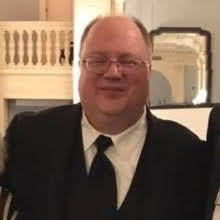
June 28, 2020
I Had Given Myself Up Entirely [LION]
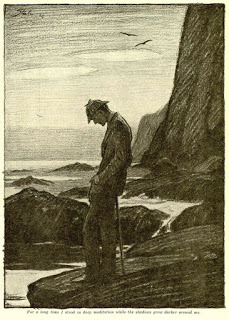
"The Lion's Mane" takes place in 1907 and was probably written by Sherlock Holmes in 1919 or 1920, when the detective was in his mid-sixties. The man in this story is a strikingly different one that readers first met in A Study in Scarlet more than thirty years before. He is a man who has rid the world of evil, stopped dangerous machinations, and foiled formidable foes. One might expect Sherlock Holmes to be a grizzled veteran from his years of war against crime, that movie trope of the old bad-ass who is called out of retirement for one more case. But instead, we see a softer and friendlier Holmes than the man who lived in Baker Street.
Maud Bellamy gives the reader a strong argument for the softening of Sherlock Holmes. The man who "did not observe" how attractive Mary Morstan was in The Sign of the Four describes Maud Bellamy as "so rare a flower" and says "that no young man would cross her path unscathed" due to her great beauty. Holmes also tells Miss Bellamy that he values a woman's instinct. This is a changed man from SIGN that said, "Women are never to be entirely trusted - not the best of them."
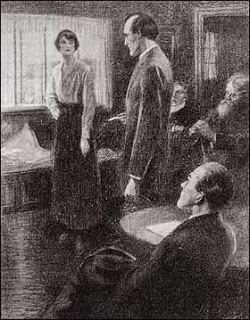
In LION, Holmes says he is always friendly with his neighbor, Harold Stackhurst, and that "he was the one man who was on such terms with me that we could drop in on each other in the evenings without an invitation." This is a far cry from the man in "The Five Orange Pips" who says that aside from Watson, he has no friends. In that same breath, Holmes flatly states that he does not encourage visitors. So, not only in retirement does Holmes have a friend who drops in to visit him, but Holmes tells us that he will go out on the occasional social call himself!
Holmes's relationship with his housekeeper also shows a change in his personality. It's clear that this woman is not his former landlady, Mrs. Hudson, but a paid domestic servant. We see time and again that Sherlock Holmes is a Victorian gentleman with Victorian attitudes towards servants throughout the Canon. That is why it is so telling that he allows gossip at his breakfast table from the housekeeper. Holmes tells the reader that he does "not encourage such conversations" but allows this instance because her news of McPherson's dog arrested his attention. But notice that his statement of not encouraging gossip leaves room for allowing things here and there, and just like the occasional visit from Harold Stackhurst, one could imagine Holmes engaging his housekeeper in random discussions about what she had heard through "that strange wireless by which such people collect the news of the country-side."
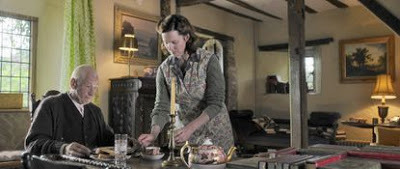
And speaking of dogs here is just one more change in the emotional makeup of the Great Detective. In this story, Holmes talks about the "beautiful, faithful nature of dogs" in relation to the creature's death. This from the same man who gave a "a perfect shriek of delight" before he poisoned a dog in A Study in Scarlet with what Watson described as a sober manner.
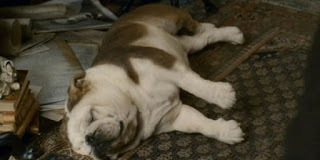
But the biggest change of all is how Sherlock Holmes is using his mind at this stage of his life. In his first chronicle, Holmes tells Watson that he considers
that a man's brain originally is like a little empty attic, and you have to stock it with such furniture as you choose. A fool takes in all the lumber of every sort that he comes across, so that the knowledge which might be useful to him gets crowded out, or at best is jumbled up with a lot of other things so that he has a difficulty in laying his hands upon it.And that is just how things are for him in retirement. Holmes says that his mind "is like a crowded box-room with packets of all sorts stowed away therein - so many that I may well have but a vague perception of what was there." Of all the changes in Sherlock Holmes over the years, this is the most glaring. We have seen him time and time again honing his knowledge, so much so that he would go days on end without eating to help focus his mind and said that he was just a brain; the rest of him was a mere appendage. Now, any old fact that is interesting is taking up space in his brain attic.
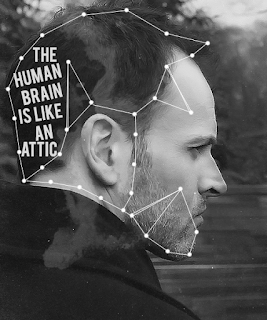
Friendships, gossip, and feelings aside, this is the proof that Sherlock Holmes has really retired. Like an over-the-hill athlete, he is no longer exercising in a specific and targeted way, but still likes general work outs. Readers who are always hoping for that trope of getting Sherlock Holmes called out of retirement for one more case should give up. The Great Detective is truly retired at this point, and enjoying the life he never allowed himself to have in London. And a well-deserved retirement it is.
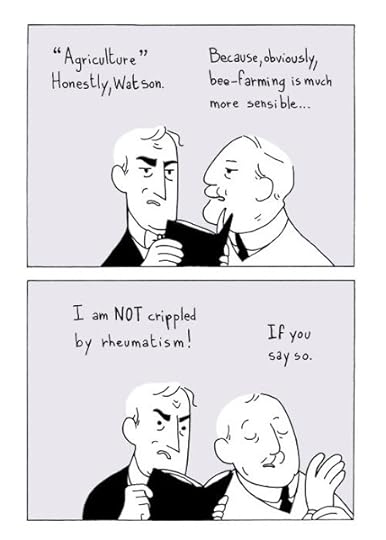
June 17, 2020
Interesting Interview: Laurie King
But Laurie King hasn't just extended the Sherlockian Canon for her readers. She has also created a great modern day detective series based around San Francisco's Kate Martinelli, other delightful standalone novels, and done some serious Sherlockian editing! Working with Les Klinger, Laurie edited The Grand Game Volumes 1 and 2 for BSI Books, making landmark early Sherlockian scholarship easily available to the modern-day reader. (Seriously, these two books should be in every Sherlockian library.) And along with Klinger, she has overseen five Sherlockian-inspired anthologies by a gigantic list of popular writers.
I could go on and on and on about how impressive Laurie King is, but let's let her do the talking from now on:
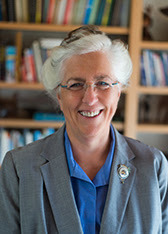
How do you define the word “Sherlockian”?
Someone who has a special place in their heart for The Great Detective. It helps if you’re
willing to believe that Holmes, Watson, and the others lived, and were not some fictional
construct of Dr Conan Doyle. It helps even more, especially for those of us still writing the
stories, if you believe that since Holmes’ obituary has yet to appear in The Times of London, that
has to mean he is still alive.
How did you become a Sherlockian?
Well, I began by reading the Conan Doyle stories, then writing stories that began in 1915, after
Sir Arthur was finished with him. And eventually I was invited to become a BSI, when I’d
demonstrated my appreciation and respect for the characters—and after I’d proven my academic
skills by giving a BSI lecture (on Watson’s War Wound, with a close focus on the bullet itself.)
What is your favorite canonical story?
I ought to say “The Red Circle,” since that is my investiture name, but I so like the fact that the
woman gets the better of Holmes in “Scandal in Bohemia” that I have to go for that one. “Good
night, Mr. Sherlock Holmes,” indeed.
Who is a specific Sherlockian that you think others would find interesting?
I have met a lot of interesting Sherlockians, but my closest partnership is with Les Klinger (“The
Abbey Grange”), who forgives all my temerities when it comes to The Great Detective.
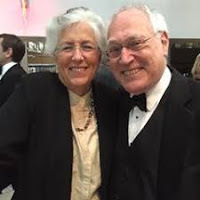
What subset of Sherlockiana really interests you?
Being what my daughter calls a “recovering academic,” I have a weakness for scholarship—the
more footnotes, the greater pomposity, and the more firmly tongue-in-cheek, the better.
What things do you like to research related to Sherlock Holmes?
I had a grand time a couple of books ago ( The Murder of Mary Russell ) doing a lot of very close
analysis of the early stories and their timelines. Unlike the others in the series, which are set
from 1915 on, large sections of that book take place in the Victorian era, as it ties together Mrs.
Hudson the landlady with the sailor Hudson from the “Gloria Scott” case. We also get to meet a
very young Sherlock Holmes, which was fun to write.
In the 26 years that the Mary Russell and Sherlock Holmes stories have been coming out,
what has been your favorite development with the series?
In two recent books, including the new one ( Riviera Gold ), Mrs. Hudson gets center stage, as a
feisty old lady who has spent much of her life getting around her employer, Holmes.
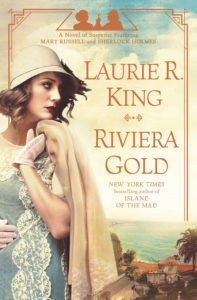
Your fifth mystery anthology full of stories inspired by Sherlock Holmes, In League with Sherlock Holmes, comes out at the end of this year and is full of authors who don't typically write about Holmes. How did this series get started and how do you keep finding so many wonderful authors to fill these volumes?
Les Klinger and I were at a mystery conference where he ran a panel about Sherlock Holmes,
with all the panelists guests of honor. He and I were talking afterward, wondering if they had
ever dabbled in writing a Holmes story, when a little light went on over his head. So we started
with them, and the collection has taken on a life of its own. All the contributors to the five books
are people we know and whose work we love, who are invariably thrilled to have an excuse to
play the Holmes game.
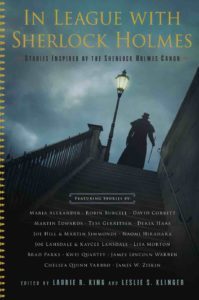
What book would you recommend to other Sherlockians?
Since much of my base research was collected in the 80's when I was first starting the series,
many of my favorites are older: Michael Harrison, HRF Keating, Dorothy Sayers, and WS
Baring-Gould. More recent is Les Klinger’s Annotated Sherlock Holmes, which belongs on the
shelf—one of the sturdier shelves—of every Sherlockian. And of course, anyone interested in
academic Sherlockiana would be wise to invest $3 in Laurie R. King’s Sherlock Holmes , an e-
book containing the definitive study on Watson’s War Wound, selections from Holmes’ lost
treatise on beekeeping, and the rationale behind the alternate chronology of the Laurie King
stories.
Where do you see Sherlockiana in 5 or 10 years from now?
I hope and trust that the entire Sherlock Holmes world will continue to shift into the more
neglected corners of the literary world, with the voices of a joyously diverse set of characters
continuing to ring the changes in this unlikely passion of ours.

June 15, 2020
Interesting Interview: Steven Doyle
Steve is a guy who always makes time for other Sherlockians. I've been to a few of the same events as Steve, and he's always engaged in a conversation with someone. And when meal time rolls around, you can usually count on Steve finding out how many people he can cram into a room so everyone can hang out together. Although, you should be careful at those meals, because the last time he and I ate together I promised him that I would watch the Dudley Moore Hound of the Baskervilles movie. And since he was kind enough to do this interview, I guess I'd better get around to watching that soon....
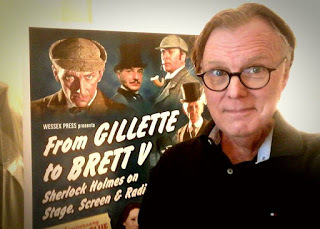
How do you define the word “Sherlockian”?
My definition of the word “Sherlockian” is similar to the term “musician.” Many people casually
enjoy music, or even play a bit, which is perfectly fine. But to be a musician implies a certain
amount of time, knowledge, and effort put forth on the subject. For me, it is the same with being
a Sherlockian.
How did you become a Sherlockian?
I fell in love with the literature of Sherlock Holmes at the age of 14 when I received facsimile
first editions of Adventures and Memoirs for Christmas. I was completely enthralled by both the
stories and the Paget illustrations. I became a Sherlockian when, shortly after this, I read the
Pinnacle paperback edition of The Private Life of Sherlock Holmes by Vincent Starrett, In the
Footsteps of Sherlock Holmes, by Michael Harrison, and The Seven-Per-Cent Solution, by
Nicholas Meyer. I read these very shortly after I had devoured the Canon, and each of them
taught me, in their own way, what this game we play is about.
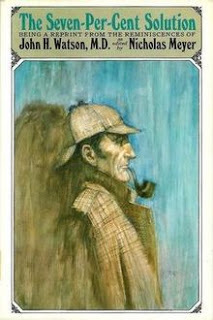
What is your favorite canonical story?
Actually, they are two stories which are really one story, that being “The Final Problem” and
“The Empty House.” There is so much going on in this whole story arc that I believe an entire
book could be written on it. There’s the Christological cycle of sacrificial death and resurrection.
There’s Moriarty as Holmes’s doppelganger. Then there is the presentation of evil, or perhaps I
should say Evil, as pervasive yet invisible…I could go on and on.
Who is a specific Sherlockian that you think others would find interesting?
Living or dead? There are so many it is difficult to pick. For newer generations of Sherlockians, I
recommend going back and reading not only the writings of the old Irregulars (which are
foundational to our hobby and demonstrate why they still matter), but about their lives as well.
These were accomplished, interesting people who created our hobby. As for living Sherlockians,
Roy Pilot, co-author of The Annotated Lost World and The Annotated White Company , is
someone who has been a mentor, inspiration, and friend for thirty years.
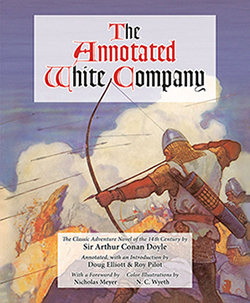
What subset of Sherlockiana really interests you?
I have a number. It is well-known that I have a love of Sherlockian cinema…actually cinema,
television, radio, and stage…all the dramatic interpretations of the character. I think it speaks to
our longing to see Sherlock Holmes and Dr. Watson in the flesh. I also love that it is a vehicle for
how Holmes is a reflection of the era in which he is being portrayed. Another is the history
Sherlockian publishing, particularly small press publishing right back to its earliest form. And
lately I’ve had a growing fascination with the history of the very first BSI dinner. But that is the
great thing about our hobby…there is so much that can capture your attention.
What things do you like to research related to Sherlock Holmes?
There’s no specific thing…what I like to research is whatever it is that has my attention and
enthusiasm at the moment. This could be anything from researching an ancient meeting of my
local scion society, to an obscure term in one of the stories, or the cultural context that a
particular Holmes film was released during. Whatever it is that has my attention.
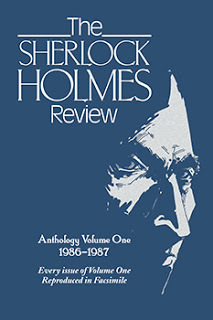
How has being a Sherlockian publisher changed from the early issues of The Sherlock
Holmes Review to the books you put out in 2020?
The biggest change is the democratization of print and publishing technology. When we started
The Review, creating it meant literally physically making it by hand…that is a huge change. But
it is more than that. Today, literally anyone put a book into print. (The same goes for other
media, by the way…think video and YouTube). This creates both tremendous opportunities for
writers, but also increased challenges for readers… “how do I have some assurance that what I
am investing my time and money in will be something worthy of reading?” I also think, despite
those who decry publishers as “gatekeepers”, it increases the need for editors and publishers. The
notion that “gatekeepers” aren’t appropriate anymore don’t understand that publishing isn’t just
about the writers. It is about the readers, and being fair and true to them as well.
What was the impetus for launching The Fortnightly Dispatch?
The Fortnightly Dispatch actually wasn’t my idea. The idea came from the BSI, who wanted to
do some kind of timely outreach in this unnatural time of isolation. As publisher of The Baker
Street Journal, and someone who is a video producer and communications professional, I was
suggested as host and producer. As host, I want to the podcast to provide knowledge of the deep,
fascinating hobby we enjoy. So many newer Sherlockians don’t have the means to learn of or
experience the history of the Sherlockian Universe…a rich history which anchors and informs
our world to this day. In recent years it has been suggested that all of that is over, that the
Sherlockian world has changed, and has moved on. But that is patent nonsense, and the response
to the podcast has been an affirmation of the this.
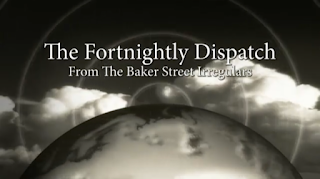
What book would you recommend to other Sherlockians?
Gosh…so hard to pick just one. I am going old-school…I would pick The Annotated Sherlock
Holmes by William S. Baring-Gould. So much of everything we are as Sherlockians is embodied
in that foundational volume.
Where do you see Sherlockiana in 5 or 10 years from now?
It is almost impossible to predict, but I have hopes that the fractious nature of the last ten years
will be behind us, and we’ll see a new found appreciation for what the Sherlockian world is,
while we move forward to embrace new ways to experience it. But I’ll leave however that works
out to the future.
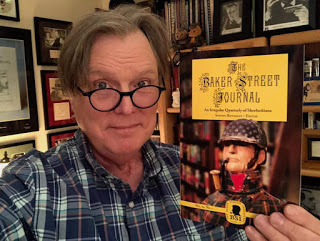
June 7, 2020
The Starting Point of So Many Remarkable Adventures [MAZA]
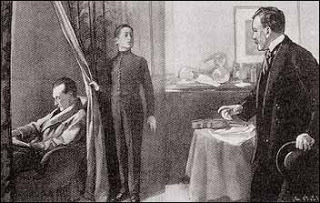
"The Mazarin Stone" was first published in the October 1921 edition of The Strand Magazine, but that was not the first time fans had seen Sherlock Holmes fool an air-rifle toting big game hunter with a wax dummy. No, this ploy was used just a few months before in Sir Arthur Conan Doyle's short-lived one-act play, The Crown Diamond: An Evening with Sherlock Holmes.
Oh were you thinking of another story? Nope, this is about Doyle's play.
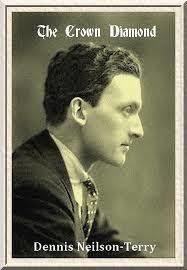
According to the introduction to The Theatrical Sherlock Holmes by Paul Stuart Hayes, The Crown Diamond was a big hit, touring for over a year around England and being a financial boon to Doyle in his later years. The public had only had one Sherlock Holmes story published in the last eleven years, "His Last Bow," and The Crown Diamond showed Doyle that there was still an audience for The Great Detective.
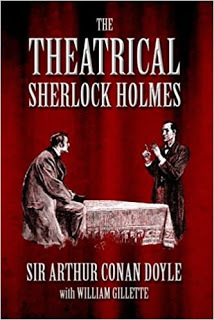
The Crown Diamond would go on to be adapted into MAZA, and this would be the first story of the final set of Sherlock Holmes stories to be released. No matter our opinion on MAZA (and mine is not good), we have this story to thank for some of the lasting impressions we have of Holmes. MAZA opened the door for "The Problem of Thor Bridge" and "The Adventure of the Illustrious Client." Without MAZA, we never would have gotten to see Holmes in retirement as we do in "The Adventure of the Lion's Mane" or his loyalty to Watson from "The Adventure of the Three Garridebs."
Although MAZA is pretty universally panned, it's an important part of the Sherlockian Canon, because without it, we may never have gotten to read a full 1/5 of the stories we've come to rely on for entertainment over the years.
Lord Cantlemere tells Holmes, "We are greatly your debtors" and we could say the same to Doyle. So here's to "The Mazarin Stone," the wilted vegetable in an otherwise delightful Sherlockian feast!

June 1, 2020
Interesting Interview: Jay Ganguly
I sent Jay an invitation to be interviewed last Fall, but unbeknownst to me, the message got caught in her Facebook security settings. So when I got a reply out of the blue last week, it was a very pleasant surprise! I've wanted to interview her for quite some time and am very pleased to share a little insight into how Sherlockiana is enjoyed in India!

How do you define the word “Sherlockian”?
Anyone with an affinity for Sherlock Holmes, whichever Avatar it might be. Because I believe in the essence of Sherlock Holmes, and that could be anywhere!
How did you become a Sherlockian?
I was twelve and bored and my Dad gave me a battered old copy of The Return of Sherlock Holmes. A few days later, I had read the full Canon, got my own new copy of the full and fallen hopelessly in love with the great detective!
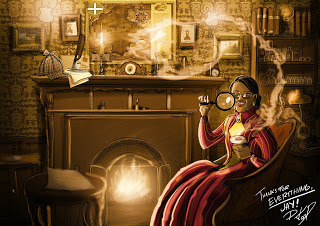
What is your favorite canonical story?
Keeps changing...but on top of my list are usually DYIN, DEVI, 3GAR and SIGN. I like PRIO, MAZA and ILLU, too.
Who is a specific Sherlockian that you think others would find interesting?
Ah, the list it too big! I don't think I've ever met or interacted with a non-interesting Sherlockian! If I absolutely had to name one... perhaps Petr Kopl from the Czech Republic. He's a brilliant graphic novelist and his adaptations of Sherlock Holmes are out of the world. Some of his graphic novels are available in English as well - I wish all of them were. I'd especially recommend his A Scandal in Bohemia . Oh, and he's the one that drew the gorgeous image that we use for the Sherlock Holmes Society of India.
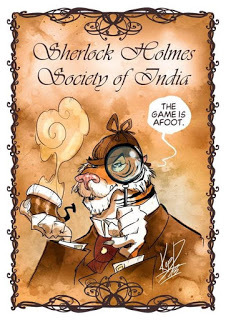
What subset of Sherlockiana really interests you?
Er... anything, really. I've been known to buy random things just because they have "Sherlock" or "Holmes" or "221" on it. And I'm crazy about Sherlockian stories - traditional pastiches, media adaptations, comics, fanfiction... anything!
What things do you like to research related to Sherlock Holmes?
Stories, stories and more stories! I look up other information when I have to write/discuss/present anything.
How did the the Sherlock Holmes Society of India start?
It was started by Mr. Sumal Surendranath in May 2001. He's the President of SHSI and one of the best people I know. (Another very interesting Sherlockian!)
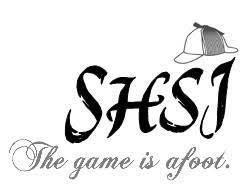
How are you able to coordinate a society that includes such a large country?
We've always been online - so it's not really a problem. We did try having annual meetings for a while, but with everyone spread out across the country, it didn't really work out very well.
What book would you recommend to other Sherlockians?
Right now? The summer issue of my e-magazine "Proceedings of the Pondicherry Lodge". The entire MX Book of New Sherlock Holmes Stories (I can gush about it for days). Any of the pastiche collections from Belanger Books (my favourites are Holmes Away From Home and Before Baker Street ) Any of Petr's graphic novels. The three books of Bonnie MacBird. The three books of Kareem Abdul Jabbar. Anything at all by Nicholas Meyer (though The Seven Percent Solution is my favourite). The Mandala of Sherlock Holmes by Jamyang Norbu. Er... I'll shut up now or it'll never end.
Where do you see Sherlockiana in 5 or 10 years from now?
Riding another crest, I believe. Sumal often says that Sherlockian interest waxes and wanes like a wave - we got a high recently with BBC Sherlock bringing in a flood of interested youngsters...and it's not as high at the moment. Perhaps it'll peak again in a few years.
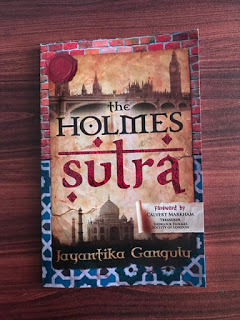
May 28, 2020
When I Look Back On It [CARD]

That got me thinking about all of the cool people that have graced this blog over the past two years. I feel like I've barely scratched the surface of interesting Sherlockians but looking at the list it's quite a good collection of names!
 March 2018: Beth Gallego
March 2018: Beth Gallego April 2018: Brad Keefauver
April 2018: Brad Keefauver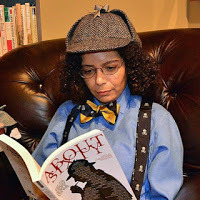 May 2018: Carlina De La Cova
May 2018: Carlina De La Cova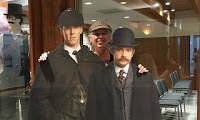 June 2018: Vicki Delaney
June 2018: Vicki Delaney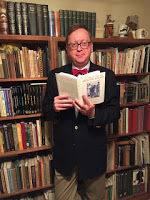 July 2018: Ray Betzner
July 2018: Ray Betzner September 2018: Ashley Polasek
September 2018: Ashley Polasek October 2018: Vincent Wright
October 2018: Vincent Wright November 2018: Leah Guinn
November 2018: Leah Guinn December 2018: Shannon Carlisle
December 2018: Shannon Carlisle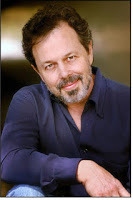 January 2019: Curtis Armstrong
January 2019: Curtis Armstrong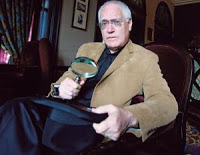 February 2019: Leslie Klinger
February 2019: Leslie Klinger March 2019: Lyndsay Faye
March 2019: Lyndsay Faye April 2019: Michael Kean
April 2019: Michael Kean May 2019: Heather Holloway
May 2019: Heather Holloway June 2019: Mattias Bostrom
June 2019: Mattias Bostrom July 2019: Tassy Hayden
July 2019: Tassy Hayden August 2019: Liza Potts
August 2019: Liza Potts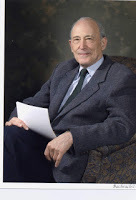 September 2019: Peter Blau
September 2019: Peter Blau October 2019: Dan Andriacco
October 2019: Dan Andriacco December 2019: Scott Monty
December 2019: Scott MontyJanuary 2020: Elinor Gray
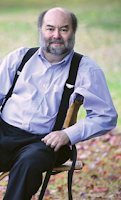 February 2020: Bob Katz
February 2020: Bob Katz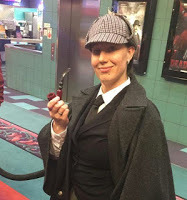 March 2020: Monica Schmidt
March 2020: Monica Schmidt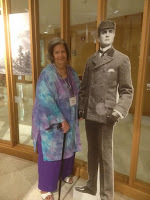 April 2020: Susan Rice
April 2020: Susan Rice May 2020: Burt Wolder
May 2020: Burt WolderWho are some people you'd like to see interviewed here in the future? Send me an email or leave a name in the comments of some folks that should be added. I have a good sized wish list, but am always looking to talk with more Sherlockians. In fact, I have so many I want to get to, my goal is to do two interviews per month over the summer. There are just so many great Sherlockians out there!
May 21, 2020
An Absorbing Interview [BRUC]
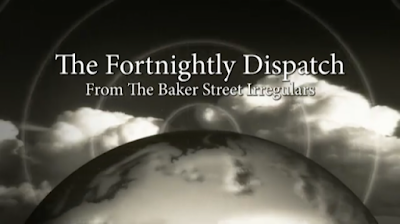
And this week, a new one joined the ranks! One that I predict will be a show that I make time for every day it comes out. The Baker Street Irregulars put out their first episode of "The Fortnightly Dispatch," a video podcast meant to have discussions with Sherlockians and connect with scion societies.
Hosted by Steve Doyle, the first episode is a lovely discussion with Ray Betzner. Steve and Ray are old friends and it shines through. Ray is an expert on Vincent Starrett, and shared many wonderful stories about one of the most important names in the founding of Sherlockiana.

I'll be honest with you, when I saw that this was a video podcast, I can't say I was all that interested. I'm an audio podcast guy. But I gave it a shot, thinking I would watch a few minutes of this and then check out the James and the Giant Peach read along videos that had also been released that day starring Meryl Streep and Benedict Cumberbatch in one and Nick Kroll and Liam and Chris Hemsworth in another.
I was absolutely transfixed by The Fortnightly Dispatch and watched it all the way through in one sitting. You hear that? Steve Doyle and Ray Betzner beat out Meryl Streep, Cumberbatch, and the Hemsworths this week as far as I'm concerned.
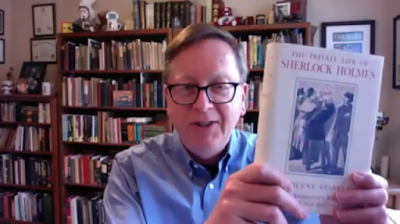
Ray talked about Starrett's masterwork: The Private Life of Sherlock Holmes, and the origins of 221B, a sonnet known to many Sherlockians around the world. And then he made everyone jealous when he showed us the manuscript page of 221B that he owns!
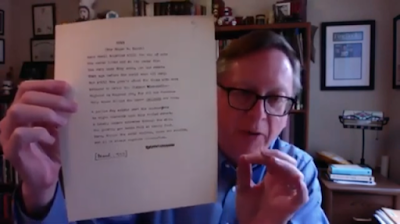
Steve's guiding questions and Ray's ability to tell great stories made for such a great watch. In a time when we can't get together, this partially fills that void. Watching friends talk about Sherlock Holmes and our hobby is a great way to pass some time.
And reveling in those libraries behind each of them is a whole different kind of pleasure!

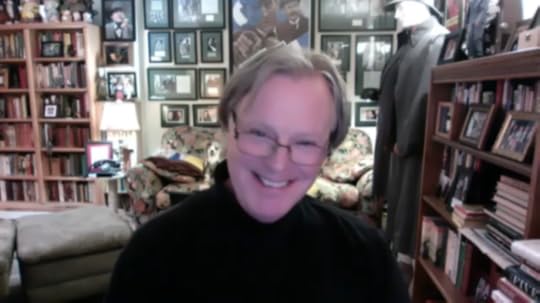
P.S. I was texting with a friend earlier this week about all of the Sherlockian podcasts out there, and promised to send him a list. I figured why not just put a list up here for everyone to see? It's by no means exhaustive, but I think you'll see what I mean when I said there are plenty out there for your tastes!
I Hear of Sherlock Everywhere
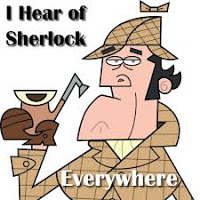
Trifles
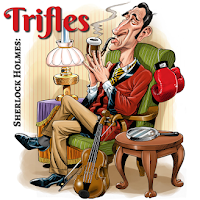
The Watsonian Weekly
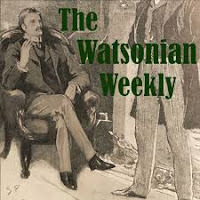
The Jeremy Brett Sherlock Holmes Podcast
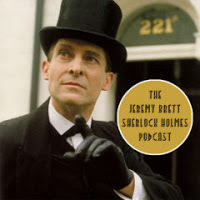
From Adler to Amberley
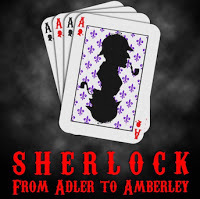
I Grok Sherlock
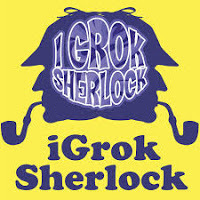
Sherlock Holmes is Real
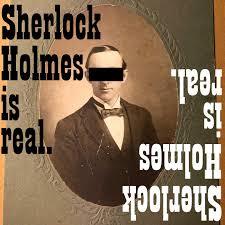
The Final Podblem
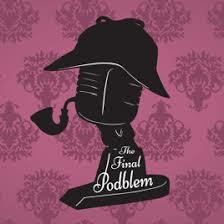
The Baker Street Babes
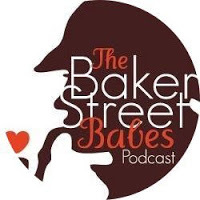
Three Patch Podcast

I Am Lost Without My Boswell

Classic Radio Shows: Sherlock Holmes
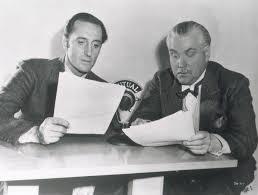
Doings of Doyle (Not quite Sherlockian....yet)
